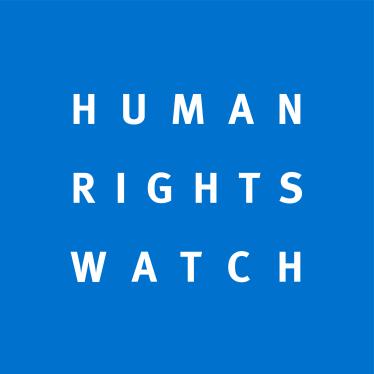Juan Thomas, Chair
Mark Schickman, Senior Advisor
Paula Shapiro, Director
ABA Section on Civil Rights and Social Justice
Hon. Benes Z. Aldana (Ret.), Chair
Skip Harsch, Director
Ann Breen-Greco
ABA Commission on Sexual Orientation and Gender Identity
Twanda Turner-Hawkins, Chair
Selina Thomas, Director
ABA Coalition on Racial and Ethnic Justice
Priya Purandare, Executive Director
Navdeep Singh, Interim Policy Director
Wendy Shiba, Past President, ABA Delegate
National Asian Pacific American Bar Association
James L. Schwartz, Chair
Richard M. Leslie, Chair-Elect
Jack Young, Delegate
Senior Lawyers Division
Marcos Rios, Chair
David Schwartz, Chair-Elect
Michelle Jacobson, Policy Officer
ABA International Law Section
cc: Deborah Enix-Ross, ABA President
Palmer Gene Vance II, Chair, House of Delegates
Dear Co-Sponsors of Proposed ABA Resolution 514 on Antisemitism,
Human Rights Watch wishes to convey its concerns with the reference to the “International Holocaust Remembrance Alliance (IHRA) working definition of antisemitism” in the proposed ABA resolution 514 on antisemitism.
Antisemitism is a pernicious ideology that poses real harm to Jewish communities in the United States, Europe, and elsewhere and requires meaningful action to combat. Human Rights Watch has called on leaders to strongly condemn such hate and take steps to protect Jewish communities, including holding criminal suspects to account.
Ongoing efforts to codify the IHRA definition into law and policy, including at the ABA, are framed as efforts to fight antisemitism. In practice, however, the IHRA “working definition” (identified by the IHRA as non-legally binding) has often been used to label as antisemitic, and thus chill and sometimes suppress, non-violent protest, activism, and speech critical of Israel and/or Zionism, including in the US and Europe.
Those who use the IHRA definition in this way tend to rely on the set of “examples of antisemitism” adopted by the IHRA in 2016 along with the definition. The examples, which are presented as possible “illustrations” to “guide the IHRA in its work” in identifying antisemitism, include:
- “denying the Jewish people their right to self-determination; e.g. by claiming that the existence of a State of Israel is a racist endeavor” and
- “applying double standards by requiring of [Israel] a behavior not expected or demanded of any other democratic nation.”
The IHRA qualifies the examples by noting that “criticism of Israel similar to that leveled against any other country cannot be regarded as antisemitic” and that any finding of antisemitism must “[take] into account the overall context.” However, in practice, these disclaimers have failed to prevent the use of the IHRA definition in efforts to muzzle the speech and activism of critics of Israel’s human rights record or advocates for Palestinian rights.
The wording of the first example on “racist endeavour” opens the door to labeling as antisemitic claims that Israeli government policies and practices violate the International Convention on the Elimination of Racial Discrimination and the findings of major Israeli, Palestinian, and global human rights organizations that Israeli authorities are committing the crime against humanity of apartheid against Palestinians. This example could also be used to label as antisemitic documentation showing that Israel’s founding involved dispossessing many Palestinians; or calls made by some Members of the Israeli Knesset, among others, to transform Israel from a Jewish state into a multiethnic state that belongs to all of its citizens equally—that is, a state based on civic identity, rather than ethnic identity.
The example on “applying double standards” opens the door to labeling as antisemitic anyone who focuses on Israeli abuses as long as worse abuses are deemed to be occurring elsewhere. By that logic, a person dedicated to defending the rights of Tibetans could be accused of anti-Chinese racism. This example suggests also that it is antisemitic to evaluate Israel as anything but a democracy, even when assessing its actions in the Occupied Palestinian Territory, where it has for more than half a century governed millions of Palestinians who have no say on the most consequential issues affecting their lives and who are deprived of their basic civil rights.
The targets of accusations of antisemitism based on the IHRA definition have included university students and professors, grassroots organizers, human rights and civil rights organizations, humanitarian groups, and members of the US Congress who either document or criticize Israeli policies and who speak in favor of Palestinian human rights.
After the United Kingdom’s government adopted the IHRA definition of antisemitism, at least two UK universities in 2017 banned certain activities planned for “Israel Apartheid Week.” One of them, the University of Central Lancashire, banned a panel planned by Friends of Palestine on boycotts of Israel. A university spokesperson stated, “We believe the proposed talk contravenes the [IHRA] definition” of antisemitism “formally adopted” by the government.
In the US, in February 2020, Israel advocacy groups challenged Pitzer and Pomona College’s support for a film screening about Palestinian protests in Gaza against Israeli repression and a panel on “Perspectives on Colleges and the Israeli-Palestinian Conflict,” featuring the prominent Jewish-American Peter Beinart and Palestinian-American Yousef Munayyer, hosted by Students for Justice in Palestine (SJP). The Israel advocacy groups claimed that SJP’s positions, such as its support for the Boycott, Divestment and Sanctions (BDS) movement, are “clear indicators of anti-Semitism under the examples listed by the IHRA.” In January 2020, Israel advocacy groups called for the University of Michigan to review the agenda for a “Youth for Palestine” conference focused on student activism and community organizing on Palestine, and to “compare it to the IHRA definition,” and consider canceling it over concern that it will feed antisemitism.
Some advocates of the IHRA definition have presented it as a “consensus” and non-controversial definition. However, many antisemitism experts, scholars of Jewish studies, and the Holocaust, and free speech and anti-racism experts have challenged it. Since the adoption by the IHRA of its definition, at least two alternative definitions have been put forward – the Jerusalem Declaration on Antisemitism by a “group of scholars in the fields of Holocaust history, Jewish studies and Middle East studies” and the Nexus Document by a task force on Israel and antisemitism affiliated with programs at Bard College and the University of Southern California-- that have tried to define when Israel criticism crosses the line.
As you are aware, Ken Stern, the main drafter of the IHRA definition, urged the ABA in a videotaped statement made in December 2022 not to include in its resolution a reference to the IHRA definition, explaining that it was drafted primarily as a tool for data-collectors, not as a definition to be codified into law or speech codes and used as “a blunt instrument to label anyone an antisemite.” He concluded his statement by asking the ABA, “Which is more important? To build consensus around the need to address antisemitism with a statement that people can support regardless of their views on the Israel-Palestine or the complicated matter of where Israel fits in Jewish identity? Or a statement that endorses IHRA, picking a side in a contentious political battle and inevitably undercutting what you’re trying to achieve?”
The ABA proposed resolution 514 after referencing in its first sentence the IHRA definition and no other, calls on governments to pass laws “to support legislation which combats and condemns antisemitism…and to pursue policies and measures that condemn and eliminate antisemitism.” Adoption of this policy position could implicate the ABA in ongoing efforts to codify the IHRA definition in legislation in ways that threaten the rights to freedom of expression and association.
As an organization committed to promoting the rule of law and human rights, the ABA should ensure that its important efforts to combat antisemitism do not inadvertently embolden policies and laws that undermine the fundamental human rights required for a healthy democracy, including the right to speak and organize in favor of Palestinian rights and to criticize unlawful Israeli government policies.
For these reasons, we urge you to revise ABA Resolution 514 so that the IHRA definition no longer appears in it as the definition of antisemitism. We would welcome the opportunity to meet with you to discuss these issues further.
Sincerely,
Eric Goldstein
Deputy Director
Middle East and North Africa Division








